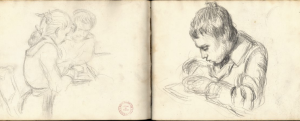Every artist sketches. In most artistic fields, the idea of sketching — of scribbling down ideas and working on them separate from a larger work — is common. Before creating a larger work, an artist will typically sketch out the ideas, work on angles and perspective, and generally try to get it right in sketch form before committing to the larger work.

From the sketchbook of Claude Monet
It’s obvious why they do this. It’s a way of practicing. But not just practicing the way a guitarist or pianist might practice scales. It’s like practicing in a way that applies directly to the project being planned.
And it leads to an important question for songwriters: Do you practice?
And that leads to another equally important question: How do you practice songwriting?
Proper practicing doesn’t just give you better ideas for the song you’re working on, or about to work on — it makes songwriting in general much easier, and speeds up your songwriting process in general.
 Gary’s most recent eBook, “Hooks and Riffs: How They Grab Attention, Make Songs Memorable, and Build Your Fan Base“, is part of “The Essential Secrets of Songwriting 10-eBook Deluxe Bundle”.
Gary’s most recent eBook, “Hooks and Riffs: How They Grab Attention, Make Songs Memorable, and Build Your Fan Base“, is part of “The Essential Secrets of Songwriting 10-eBook Deluxe Bundle”.
So how to practice? First of all, get a simple, barebones version of your song working, and then start experimenting. Here are some tips for what a songwriting practice session could or should look like:
- Look at how one section connects to the next. This is an important detail that doesn’t get enough attention. How one section moves on and connects to the next one has everything to do with musical energy and momentum. So look at:
- how the chords at the end of a section connect to the first ones of the next, and try some substitutions;
- how the lyric that finishes one section joins on to the lyric of the next. Is it logical? Does it sound right? Experiment with other options;
- how the melody connects to the next section. If the chorus is a lot higher than the verse, you may need a pre-chorus;
- Consider chord progression substitutions. Have you come up with the optimum chord progression for your song? It will amaze you, for example, how substituting a ii-chord for a IV-chord will change the mood of your music, and that can be either a positive or negative change. Subbing chords out can be a very interesting experiment.
- Rework your lyric. There are countless ways to communicate a song’s message. Create (and re-create, if necessary) word lists, and try different combinations. Think about imagery, metaphors, and other poetic devices as you hone your song’s message.
- Rework your melody. Remember, no one walks around singing chord progressions. They don’t typically recite song lyrics. But they do sing and hum melodies. So it’s important to get it right. Think about ways to modify your melodies, and pay particular attention to how the melody of one section partners with a melody in another. Think of ways to make your verse melody a sensible partner for your chorus.
All of this can and should be done by singing a very basic, unadorned version of your song. Remember, you want to get the components working well, and then, just as the painter gets the sketch to look right, you’ll then have something you can transfer to a “larger canvas.”
There’s a larger benefit that happens when you “practice” your song this way. You start to gain a repertoire of ideas for how to approach every song you write. You get the basic framework in place, and then it becomes automatic to experiment with chords, lyrics, melodic ideas and the basic structure of your music.
The end result of this kind of targeted practicing is that you become a much more prolific writer, you gain confidence, and you help to keep songwriter’s block at bay.
 Written by Gary Ewer. Follow on Twitter.
Written by Gary Ewer. Follow on Twitter.
“The Essential Secrets of Songwriting” eBook Bundle packages have been used by thousands of songwriters to polish their technique and take their music to a new and exciting level of excellence. READ MORE..











I totally agree that we must sing our song lyrics, as the song evolves
it’s the only way for finding the right emotion for our lyrics
Dont be in a hurry to settle for the first lines that come into your head,
Shortening or lengthening your lines no matter how slight or drastic
will in fact lead you to the right permutation, Even then once you
have settled for a catchy appropriate chord sequence, it’s amazing how
much you can alter your melody to improve the song;
Re writing is what it’s all about it seldom comes out first time
The more you write the better you will become, it can be a long
apprenticeship for most of ud